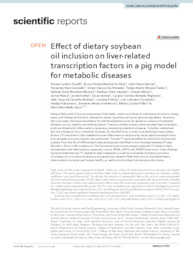Effect of dietary soybean oil inclusion on liver-related transcription factors in a pig model for metabolic diseases.
Effect of dietary soybean oil inclusion on liver-related transcription factors in a pig model for metabolic diseases.
Author(s): FANALLI, S. L.; SILVA, B. P. M. DA; GOMES, J. D.; CICONELLO, F. N.; ALMEIDA, V. V. DE; FREITAS, F. A. O.; MOREIRA, G. C. M.; VIGNATO, B. S.; AFONSO, J.; REECY, J.; KOLTES, J.; KOLTES, D.; REGITANO, L. C. de A.; BAILEIRO, J. C. DE C.; FREITAS, L.; COUTINHO, L. L.; FUKUMASU, H.; ALENCAR, S. M. DE; LUCHIARI FILHO, A.; CESAR, A. S. M.
Summary: Dietary fatty acids (FA) are components of the lipids, which contribute to membrane structure, energy input, and biological functions related to cellular signaling and transcriptome regulation. However, the consumers still associate dietary FA with fat deposition and increased occurrence of metabolic diseases such as obesity and atherosclerosis. Previous studies already demonstrated that some fatty acids are linked with inflammatory response, preventing metabolic diseases. To better understand the role of dietary FA on metabolic diseases, for the first time, a study to identify key transcription factors (TF) involved in lipid metabolism and inflammatory response by transcriptome analysis from liver samples of animal models was performed. The key TF were identified by functional enrichment analysis from the list of differentially expressed genes identified in liver samples between 35 pigs fed with 1.5% or 3.0% soybean oil. The functional enrichment analysis detected TF linked to lipid homeostasis and inflammatory response, such as RXRA, EGFR, and SREBP2 precursor. These findings demonstrated that key TF related to lipid metabolism could be modulated by dietary inclusion of soybean oil. It could contribute to nutrigenomics research field that aims to elucidate dietary interventions in animal and human health, as well as to drive food technology and science.
Publication year: 2022
Types of publication: Journal article
Observation
Some of Embrapa's publications are published as ePub files. To read them, use or download one of the following free software options to your computer or mobile device. Android: Google Play Books; IOS: iBooks; Windows and Linux: Calibre.
Access other publications
Access the Agricultural Research Database (BDPA) to consult Embrapa's full library collection and records.
Visit Embrapa Bookstore to purchase books and other publications sold by Embrapa.

